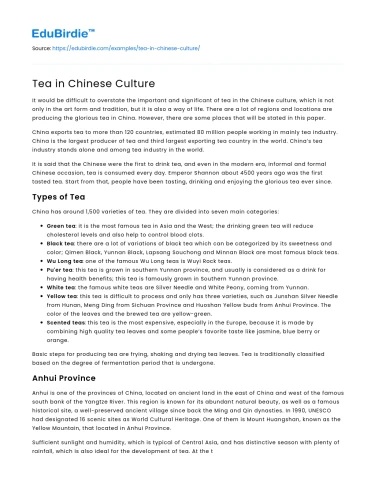Introduction
The profound significance of tea in Chinese culture transcends mere beverage consumption; it is intricately woven into the social, spiritual, and economic fabric of the nation. Originating over 5000 years ago, tea has evolved from a medicinal concoction to a globally cherished drink, with China at the heart of its history. The cultural practices surrounding tea encompass a rich tapestry of traditions and philosophies, embodying values such as harmony, respect, and tranquility. This essay delves into the multifaceted role of tea in Chinese culture, examining its historical roots, its continued relevance in modern society, and the philosophical underpinnings that have shaped its perception. Through an exploration of these dimensions, we aim to understand why tea remains an emblematic component of Chinese identity, reflecting both the country's ancient heritage and its contemporary values.
Historical Roots and Evolution of Tea
Tea's origins in China are steeped in legend and historical significance. According to Chinese mythology, Emperor Shen Nong discovered tea in 2737 BCE when leaves from a wild tea tree accidentally blew into his pot of boiling water. This serendipitous event marked the beginning of tea's journey as a staple in Chinese culture. Initially, tea was used for its medicinal properties, believed to aid digestion and provide mental clarity. Over the centuries, tea cultivation and preparation evolved significantly, particularly during the Tang Dynasty (618-907 CE), when it became a popular social beverage. The Tang era saw the publication of "The Classic of Tea" by Lu Yu, a seminal work that laid the foundation for tea culture and its associated rituals.
Save your time!
We can take care of your essay
- Proper editing and formatting
- Free revision, title page, and bibliography
- Flexible prices and money-back guarantee
Tea's evolution continued through the Song Dynasty (960-1279 CE), where the art of tea preparation became more sophisticated, emphasizing aesthetics and the spiritual experience of tea drinking. By the Ming Dynasty (1368-1644 CE), loose leaf tea replaced the traditional compressed tea cakes, leading to the development of various brewing techniques still in use today. The historical trajectory of tea in China highlights its transition from a medicinal herb to a cultural symbol, reflecting broader social and economic changes. As tea spread along trade routes, it became a valuable commodity, influencing global trade patterns and cultural exchanges. Thus, the history of tea in China is not merely a chronicle of a drink but a narrative of cultural transformation and globalization.
Tea Ceremonies and Philosophical Underpinnings
Tea ceremonies in China are a testament to the beverage's deep-rooted philosophical significance. These ceremonies are not just about drinking tea; they are a form of artistic expression and spiritual practice. Influenced by Daoism, Confucianism, and Buddhism, the Chinese tea ceremony embodies principles such as simplicity, humility, and mindfulness. The Daoist influence is evident in the emphasis on harmony with nature, reflected in the serene settings often chosen for tea gatherings. Confucian values of respect and hierarchy are observed in the ceremonial preparation and serving of tea, where roles and order are meticulously maintained.
Buddhist philosophy contributes to the meditative aspects of the tea ceremony, promoting mindfulness and present moment awareness. As noted by Lin Yutang, a renowned Chinese writer, "Tea tempers the spirit, harmonizes the mind, dispels lassitude, and relieves fatigue." This quote encapsulates the holistic benefits of tea, extending beyond physical refreshment to mental and spiritual rejuvenation. In modern times, these philosophical underpinnings continue to attract individuals seeking solace from fast-paced lifestyles, underscoring tea's enduring appeal. The ritualistic aspects of Chinese tea culture, therefore, offer a window into the nation's philosophical landscape, illustrating how tea serves as a conduit for cultural continuity and introspection.
Modern Relevance and Global Influence
In contemporary society, tea remains a vital part of Chinese culture, adapting to changing lifestyles while preserving traditional values. The modern tea house, a fusion of traditional tea culture and contemporary social spaces, exemplifies this adaptation. These venues serve as hubs for social interaction, business meetings, and cultural exchange, reinforcing tea's role as a social lubricant. The rise of tea tourism in regions like Fujian and Yunnan also highlights tea's economic significance, attracting visitors eager to experience authentic tea culture. Globally, the influence of Chinese tea culture is evident in the proliferation of tea brands and the popularization of tea varieties such as green and oolong tea.
However, the global tea landscape also presents challenges, such as the commodification of tea and the loss of traditional practices. Critics argue that the commercialization of tea undermines its cultural and philosophical essence, reducing it to a mere product. Nonetheless, initiatives promoting organic farming and sustainable practices aim to address these concerns, preserving the cultural integrity of tea production. Despite these challenges, the global appreciation for tea continues to grow, with tea festivals and cultural exchanges fostering cross-cultural understanding. In this context, tea serves as a cultural ambassador, bridging gaps and fostering dialogue between East and West. Thus, while modernity presents both opportunities and challenges, tea remains a dynamic aspect of Chinese culture, emblematic of its adaptability and timeless relevance.
Conclusion
In conclusion, tea is not merely a beverage in Chinese culture; it is a symbol of the country's historical richness, philosophical depth, and cultural adaptability. From its ancient origins to its modern manifestations, tea embodies a spectrum of cultural values and practices that continue to resonate with people both within and outside China. The historical evolution of tea highlights its role as a catalyst for social and economic transformation, while the philosophical ideals underpinning tea ceremonies offer insights into the Chinese way of life. Despite the challenges posed by globalization and commercialization, tea remains a potent cultural force, reflecting China's ability to harmonize tradition with modernity. As we sip a cup of tea, we partake in a cultural ritual that transcends time and geography, connecting us to the wisdom and tranquility that have defined Chinese tea culture for millennia.






 Stuck on your essay?
Stuck on your essay?

